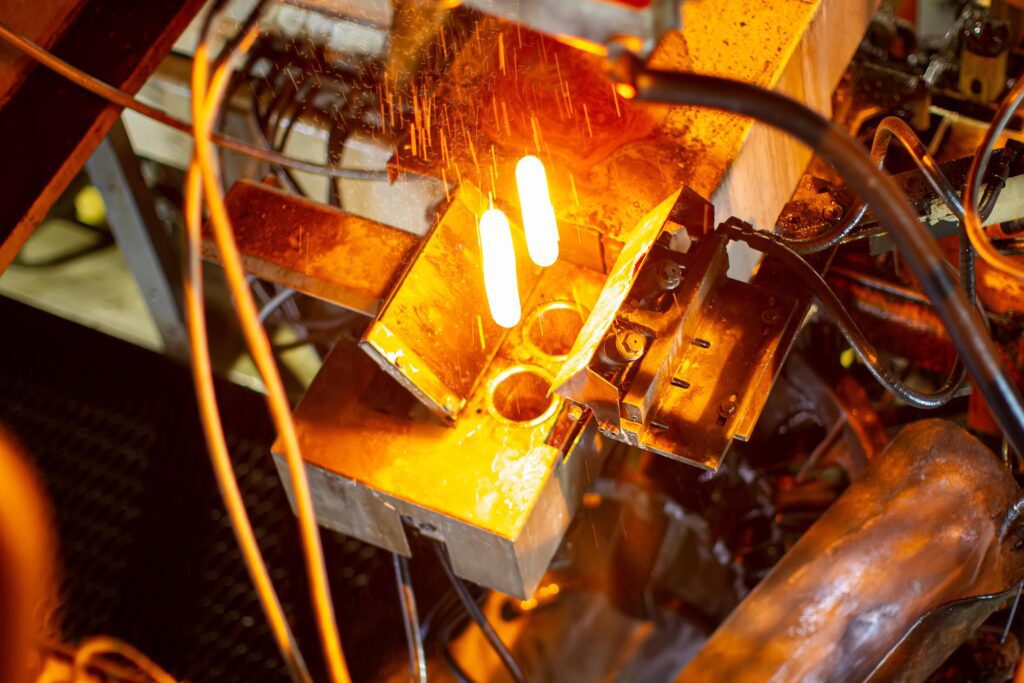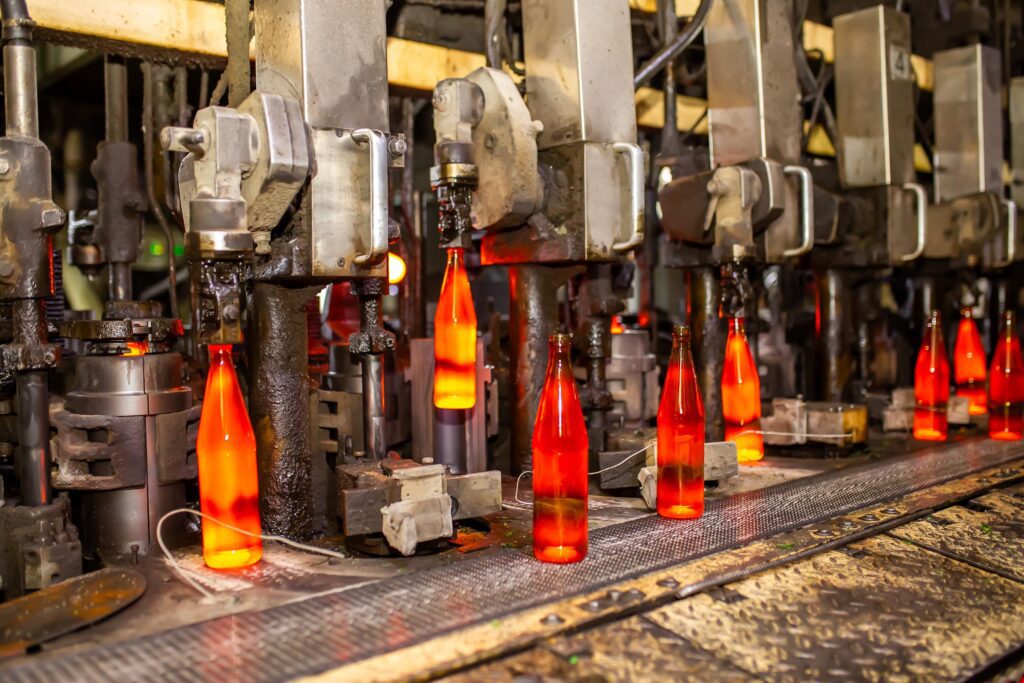Because perfect surfaces are essential in mouldmaking in the glass industry: grinding and polishing tools from LUKAS-ERZETT.
From food and beverages to cosmetics and pharmaceuticals – glass is a packaging material that also offers consumers many advantages as well. Mouldmaking plays a decisive role in the glass industry for the production of bottles, glass jars or cosmetics pots. As do the grinding and polishing tools from LUKAS-ERZETT. That is because only moulds with dimensionally accurate, flawless surfaces are suitable for producing perfect glass containers. This applies to both large shapes as well as small surfaces and screw caps, for example.
Experienced mouldmaking partner in the glass industry: LUKAS-ERZETT.

As glass products frequently necessitate tight tolerances and exact dimensions, mouldmaking in the glass industry must be extremely precise. This is why high quality grinding and polishing tools are essential for the manufacture of moulds for producing glass containers such as bottles, jars and other vessels where the utmost precision and surface quality are required.
With more than 85 years of experience in developing and producing first-class tools and special milling, grinding, polishing, cutting, drilling and cleaning solutions, LUKAS-ERZETT GmbH and Co. KG has established itself as a reliable mouldmaking partner and a leader in the sector.
LUKAS-ERZETT supports the glass industry with a broad range of innovative and high performance solutions. These include many tools specially developed for mouldmaking which can be used to precisely and efficiently process materials typically used in the glass industry such as cast iron, steel and bronze.
Everything to maximise surface quality in mouldmaking in the glass industry.
Mould surface finishing in the glass industry is a crucial process step as the surface quality of the moulds has a direct effect on the quality of the manufactured glass products. The surfaces are pre-machined with ceramic abrasives to remove coarse unevenness, burrs and machining marks that occur, for example, when milling or turning the moulds. From the smoothening (coarse polishing) and main machining (fine polishing) stages through to the final finish (mirror finish) with diamond or wax paste LUKAS-ERZETT offers a huge assortment of tools and products for every work step. These include abrasive sleeves, grinding discs and mounted points in various shapes, which are tailored to every application and cover the entire spectrum of grinding application technology.

For fine machining, LUKAS-ERZETT has developed a wide range of polishing tools comprising many different raw materials, grit combinations and hardness levels. LUKAS polishing tools are categorised into groups P1 to P7, according to the respective application. These tools include polishing wheels, points and sticks to cover a wide variety of applications.
We will now take a closer look at some of these tools and how they are used in mouldmaking, as exemplified by small surfaces. Perfectly designed tools are naturally also available for polishing large surfaces, such as the LUKAS SLTM mixed fleece disc (grit size A 104/80), the LUKAS SLTV fleece disc (grit size A 107) and the LUKAS P6PT polishing discs (grit sizes 150 MP, 240 MWP, 400 WP and 800 WP).
Polishing small surfaces in mouldmaking: coarse polishing (smoothening) with LUKAS-ERZETT P1 tools.

LUKAS P1 polishing points, for example, are suitable for the coarse polishing of small surfaces. They consist of a hard rubber bond and are available in different sizes, shaft diameters and shapes (such as cylindrical, conical round, conical pointed, cylindrical round or spherical). Among other purposes, they are ideal for coarse polishing in mouldmaking in the glass industry and ensure the perfect preparation of a surface for the next polishing steps.
The surface finish corresponds to a finish with grit size F100. Due to the hard rubber bond, these polishing points are particularly suitable for coarsely polishing cast materials in mouldmaking in the glass industry as well as both hardened and unhardened or alloyed and non-alloyed steels.
They do not clogg and have a long and efficiency tool life when used with moderate pressure. Other advantages include the high-quality steel shaft with its zinc-nickel coating and the perfect dimensional stability, which makes for a perfect fit in power tools such as straight grinders.
Polishing small surfaces in mouldmaking: Fine polishing (main machining) with LUKAS-ERZETT P2 tools.
LUKAS polishing points and polishing discs from the P2 group are especially suitable for the fine to gloss polishing of previously prepared small surfaces. They are manufactured with a soft rubber bond and are available in grit sizes 46 to 800. These tools are perfect for creating dull brushed and matt finishes. Several tools with different grit sizes should be used in succession. A mouldmaking workpiece could first be polished with a 280 grit, for example, followed by a 400 grit.
LUKAS P2 polishing points are available in a comprehensive range of shapes and sizes. They are colour-coded to prevent any confusion and to avoid any errors in the polishing process. The soft rubber bonding allows for a very soft grinding effect. Other advantages of the LUKAS P2 polishing points are the high quality steel shaft with its zinc-nickel coating and the perfect dimensional stability, which makes for a perfect fit in power tools such as straight grinders. Polishing discs in this group are also available with a maximum diameter of 200 mm in the grit sizes 46 to 800.
Polishing small surfaces in mouldmaking: Mirror polishing (finishing) with LUKAS-ERZETT P3 tools and diamond paste.
LUKAS felt polishing points and LUKAS P3 felt polishing discs are ideally suited for the final mirror finishing of pre-polished small surfaces. Thanks to the company’s many years of experience, the range of LUKAS felt polishing tools includes many different commonly used shapes in various dimensions. They are used together with an SIC or diamond polishing paste to give the best results through to a mirror finish. Thanks to their excellent dimensional stability, LUKAS felt polishing points in combination with LUKAS diamond pastes are also suitable for polishing particularly complicated shapes, such as those used in mouldmaking in the glass industry.
The LUKAS silicon carbide grinding pastes for polishing pre-ground metallic surfaces can be diluted and washed off with oil, petroleum and petrol. They are ideal for polishing steel, iron and cast material, as well as bronze, brass and copper.
The diamond pastes from LUKAS-ERZETT are available as both monocrystalline and polycrystalline pastes with grit sizes from 15 to 1 μm. They can be used to quickly and economically polish different materials and are ideal for mouldmaking in the glass industry. Another advantage is that the viscosity of LUKAS diamond pastes can be diluted with water, oil and alcohol for perfect polishing results.
Premium class grinding and polishing tools for mouldmaking and comprehensive advice – you get both with LUKAS-ERZETT.
Grinding and polishing tools from LUKAS-ERZETT help customers master the challenges of mouldmaking in the glass industry precisely and efficiently. In-house experts are on hand to share their expert knowledge and provide advice, for instance to select the most efficient tools for the various work steps to help increase your productivity. Visit the LUKAS-ERZETT website for more information about LUKAS grinding and polishing tools for mouldmaking in the glass industry and the diverse range of services that create tangible added value.
LUKAS-ERZETT employees are also available by telephone or email to answer your specific questions and give in-depth advice.